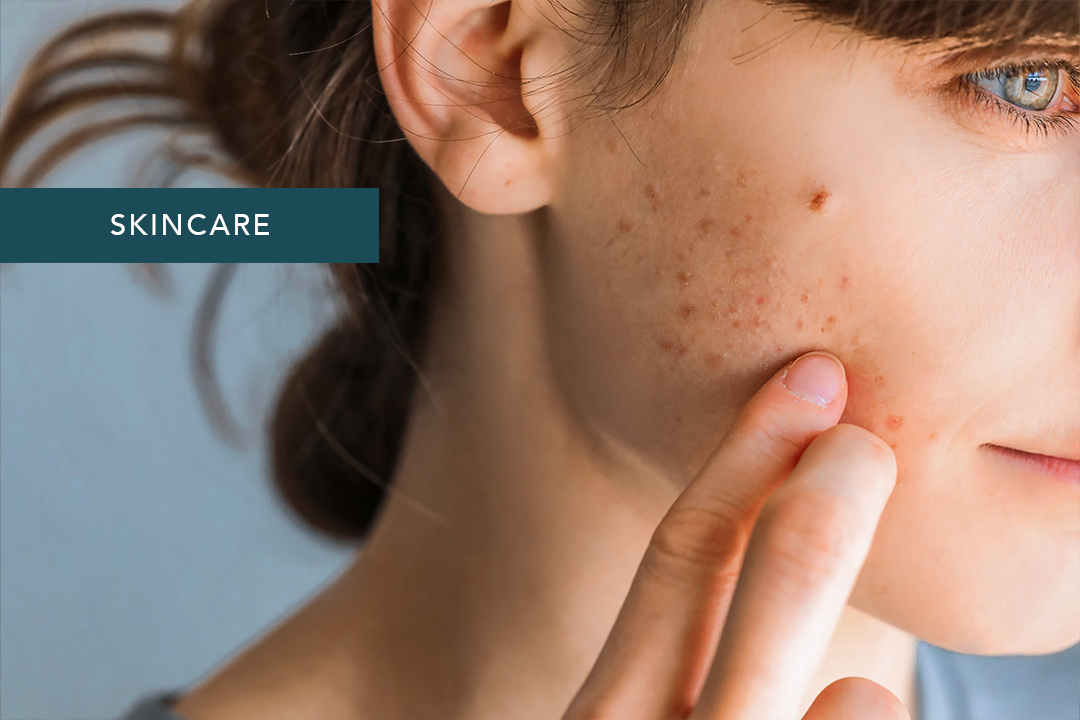什麼是皮膚屏障?
皮膚屏障,也稱為水分屏障,是由神經醯胺、脂質、脂肪酸和化學 pH 屏障組成的關鍵屏障。它可以防禦環境侵害和細菌感染,同時鎖住水分,保持皮膚濕潤和健康。
從本質上講,皮膚屏障是皮膚的前線防禦,充當抵禦外界的安全衛士。強大的皮膚屏障對於維持皮膚健康至關重要,因為該屏障的損壞會使皮膚容易受到污染、紫外線照射、物理損傷和化學刺激,從而損害其整體完整性和外觀。
皮膚屏障如何受損?
壓力、長時間暴露在陽光下以及使用鹼性產品也會對皮膚屏障造成重大損害。紫外線輻射的有害影響進一步加劇了這個問題,強調需要採取全面的護膚措施來保護和滋養皮膚。
如何辨識受損的皮膚屏障?
識別受損的皮膚屏障通常很簡單,常見的指標包括敏感、發紅、刺痛感、脫水和搔癢。發紅通常是最初的跡象,表明需要立即關注皮膚的受損狀態。
此外,皮膚屏障受損的一個標誌是使用護膚品時出現刺痛或灼熱感。這種高度的敏感性,即使是對溫和的產品,也表明屏障嚴重受損,需要謹慎對待皮膚護理,以避免進一步刺激並促進癒合。
皮膚屏障受損和痤瘡之間有關聯嗎?
青春痘不只是青少年的困境;它也是青少年的困境。對許多人來說,這個問題一直持續到成年。雖然荷爾蒙波動是青少年痤瘡的常見罪魁禍首,但成人痤瘡往往源於不同的因素。認識到受損的皮膚屏障如何導致痤瘡對於培養更健康的皮膚至關重要。
受損的皮膚屏障會促進經皮水分流失,從而加劇或引發痤瘡爆發。激進的痤瘡治療方法,例如過氧化苯甲酰或過度去角質,可能會進一步損害皮膚的保護層,從而使情況惡化。
對於尋求解決方案的護膚愛好者來說,建立全面的護膚程序是關鍵。強調溫和、滋養的產品可以幫助修復皮膚屏障,為更清晰、更有彈性的皮膚奠定基礎。這種方法不僅可以解決目前的痘痘問題,還可以預防未來的皮膚問題。
皮膚屏障可能會透過各種方式受到損害,因此需要防止或避免此類破壞因素。環境污染物、極端濕度或乾燥以及過度去角質是罪魁禍首。此外,使用刺激性肥皂進行過度清潔會去除天然油脂,從而削弱這一關鍵的保護層。
修復因痤瘡而受損的皮膚屏障
要修復因痤瘡而受損的皮膚屏障,請專注於含有神經酰胺、脂肪酸和透明質酸的溫和保濕護膚產品。避免使用刺激性的去角質產品,並選擇菸鹼醯胺等抗發炎成分。平衡肌膚的水分含量是修復屏障的關鍵,同時也能有效解決痤瘡問題。
確定痤瘡和受損的皮膚屏障
確定您是否患有痤瘡或皮膚屏障受損需要檢查您的症狀。痤瘡通常表現為丘疹、黑頭和白頭,而受損的皮膚屏障則表現為乾燥、敏感和刺激。如果您的皮膚感覺緊繃、剝落或異常敏感,問題可能是屏障受損,而不是痤瘡。
皮膚屏障受損的表現
受損的皮膚屏障通常會顯得乾燥、暗淡、片狀,並伴隨明顯的發紅和刺激。皮膚可能會感覺異常緊繃或敏感,尤其是在接觸水或護膚品後。這種受損的狀況使皮膚更容易受到外部侵害,導致不適感增加和明顯的痛苦跡象。
治療受損的皮膚屏障
治療受損的皮膚屏障需要採取溫和且恢復性的方法。簡化您的護膚程序,並專注於支持皮膚保濕和屏障修復的產品。尋找神經醯胺、膽固醇和脂肪酸等成分。盡量減少接觸潛在刺激物,例如香料和刺激性化學物質,並使用適當的防曬霜保護皮膚免受環境損害。
不同膚質的特殊護膚注意事項
每種皮膚類型都需要量身定制的護膚策略,以確保皮膚屏障的健康和修復。乾性肌膚需要大量補水,受益於玻尿酸等關鍵成分,而油性肌膚則喜歡清爽的保濕霜。對於皮膚敏感的人來說,溫和的護理方案至關重要。
對於容易長粉刺的人來說,選擇不會引起粉刺的產品並謹慎添加活性成分至關重要。長期爆發的戰鬥或對更嚴重皮膚問題的擔憂應促使您諮詢醫療保健專業人士或皮膚科醫生以獲取客製化建議。
要解決受損的皮膚屏障與痤瘡之間的聯繫,需要量身定制的溫和護膚方法,強調使用神經酰胺、脂肪酸和透明質酸進行保濕和屏障修復。區分痤瘡和屏障損傷症狀可以進行有針對性的治療,同時根據您的皮膚類型調整護理並在需要時尋求專業建議,從而打造更健康、更有彈性的膚色。


